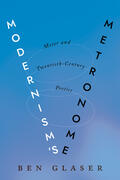
In the twentieth century, meter became an object of disdain, reimagined as an automated metronome to be transcended by new rhythmic practices of free verse. Yet meter remained in the archives, poems, letters, and pedagogy of modern poets and critics. In Modernism’s Metronome, Ben Glaser revisits early twentieth-century poetics to uncover a wide range of metrical practice and theory, upending our inherited story about the “breaking” of meter and rise of free verse.
Glaser argues that diverse poets wrote in meter as a self-conscious residual form or vestige of the poetic past. Meter as vestige resists ideologies of modern form that foreclosed fundamental questions about literary history, identity, and poetry as a genre. This tension is most acute for women and African American poets, as they negotiate literary history through prosody. Revealing the range and intensity of metrical practices and studies of versification, Glaser reorients the modern poetry canon around this historical field of production. Through close readings and scansions grounded in both history and contemporary metrical theory, Glaser attunes modernist studies to the felt limits of aesthetic autonomy and avant-garde form, anxiety about unstable literary publics, and hesitation about the future of poetry criticism. Bringing recent work in historical poetics firmly into the twentieth century, he establishes the abstraction from meter to rhythm as essential to the idealization of lyric in and after New Criticism.